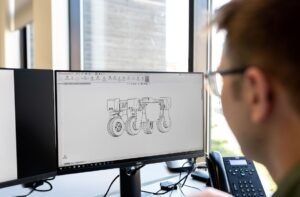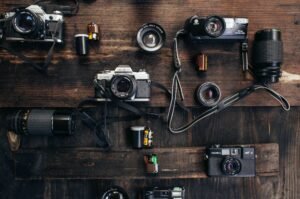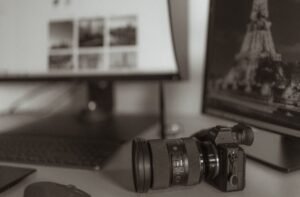Is AI Music Copyrighted?
The growing advancements in Artificial Intelligence (AI) have revolutionized various industries, and the world of music is no exception. With the rise of AI-generated music, many questions have emerged regarding its legal status. Specifically, is AI music copyrighted? Let’s explore this fascinating topic and shed light on the legal implications surrounding AI-generated compositions.
Key Takeaways
- AI-generated music can be protected by copyright, similar to traditional compositions.
- Ownership of AI music is determined by the creator or the entity that owns the AI system.
- AI algorithms used to generate music are not eligible for copyright protection.
- AI-generated music raises unique challenges in terms of authorship and originality.
Understanding AI Music Copyright
AI-generated music falls under the same legal framework as traditional compositions, meaning it can indeed be copyrighted. When music is created by an AI system, whether it’s through machine learning algorithms or deep neural networks, the resulting compositions can be considered original works eligible for protection. However, it’s crucial to distinguish between the copyright of the music itself and the copyright of the AI system used to generate it. While the music may be protectable, the AI algorithm behind it is not.
It is important to note that copyright laws differ from country to country, so it’s essential to consult local regulations to ensure full compliance.
Ownership of AI Music
When it comes to ownership of AI-generated music, the legal framework can get complex. In most cases, the creator or the entity that owns the AI system used to generate the music holds the rights to the compositions. This means if an AI generates music within the scope of employment or under a specific contractual agreement, the employer or the contracting party may claim the copyright. Clear agreements and contracts should be in place to define ownership rights, especially when using AI systems developed by third parties.
It’s fascinating to see how legal systems are adapting to the emergence of AI-generated music and grappling with the challenges it poses in terms of attribution and ownership.
The Challenges of AI-generated Music
AI-generated music presents unique challenges compared to compositions created by human musicians. The question of authorship becomes more complex when the music is entirely or partially generated by an AI system. While AI can learn from existing musical works to mimic certain styles or genres, it lacks the inherent creativity and emotional depth that human composers bring to their compositions. This raises questions about the originality and true “creative” nature of AI-generated music.
Furthermore, AI music may sometimes incorporate copyrighted elements from existing compositions, which can lead to potential infringement issues. It becomes crucial for AI music creators to ensure that their algorithms are properly trained and do not produce music that violates the copyright of others.
| Pros | Cons |
|---|---|
| AI can generate a vast amount of music quickly. | AI lacks the human touch and emotional depth in music. |
| AI can explore new musical possibilities and experiment with different genres. | AI music may lack originality and be seen as mere imitations of existing music. |
| AI music can be used in various applications, such as background music in films, games, and advertisements. | AI compositions may face challenges related to copyright and ownership. |
AI Music and Copyright Infringement
AI-generated music can inadvertently infringe on existing copyrights if the algorithms used are not adequately trained or programmed. There have been cases where AI systems produced music that closely resembled copyrighted compositions, resulting in legal disputes. It is crucial for AI music creators to exercise caution and ensure that their algorithms are sufficiently trained to avoid copyright infringement issues.
Despite the challenges, AI-generated music has the potential to push the boundaries of creativity and bring new experiences to listeners.
| Legal Aspect | Summary |
|---|---|
| Originality | AI music raises questions about the true originality and creative input of the AI system. |
| Ownership | Ownership of AI-generated music is typically held by the creator or the entity that owns the AI system used. |
| Infringement | AI music can inadvertently infringe on existing copyrights if algorithms are not properly trained. |
The Future of AI Music and Copyright
As AI technology continues to advance, the legal landscape surrounding AI-generated music will likely evolve. New regulations and frameworks will need to be developed to address the unique challenges of AI creations. It remains a delicate balance to strike between protecting the rights of composers and encouraging innovation in the realm of AI-generated music.
| Possible Development | Description |
|---|---|
| Clear Guidelines | Regulatory bodies may establish clearer guidelines on ownership and attribution of AI-generated music. |
| AI Legal Personhood | There may be discussions on granting AI legal personhood, considering it as a separate entity for ownership and responsibility purposes. |
| Collaboration and Licensing | Collaborative efforts between human composers and AI systems may become more prevalent, leading to new licensing models. |
In summary, AI-generated music can be subject to copyright protection, similar to traditional compositions. The ownership of AI music depends on the creator or the entity that owns the AI system used. However, the AI algorithms themselves are not eligible for copyright protection. AI music raises unique challenges in terms of authorship and originality, and creators must ensure they are not infringing on existing copyrights. As AI technology progresses, the legal framework surrounding AI-generated music will continue to evolve, shaping the future of this captivating artistic domain.

Common Misconceptions
Paragraph 1: AI Music is Automatically Copyrighted
One common misconception people have regarding AI music is that it is automatically copyrighted once it is created by an AI system. This is not true, as copyright protection is granted to original works that exhibit a sufficient amount of creativity. AI-generated music may lack the human-like creativity required to be eligible for copyright protection.
- Copyright protection is granted to original works with sufficient creativity.
- AI music may lack the human-like creativity required for copyright protection.
- Copyright is not automatically granted to all forms of AI-generated music.
Paragraph 2: AI-Generated Music is Always Infringing
Another misconception is that all AI-generated music necessarily infringes on existing copyrights. While it is true that some AI systems are trained using copyrighted music, not all AI-generated music is infringing. AI can be programmed to generate original compositions that do not rely on copyrighted material, potentially avoiding any infringement issues.
- Not all AI-generated music infringes on existing copyrights.
- AI can be programmed to generate original compositions.
- AI systems trained using copyrighted music may still produce non-infringing works.
Paragraph 3: AI Music is Free for Public Use
Many people assume that AI-generated music is free for anyone to use without obtaining permission or licenses. However, the use of AI music may still be subject to copyright laws and restrictions. Even if AI-generated music lacks human authorship, it may still fall under the protection of a corporation or individual who owns the AI system responsible for its creation.
- AI-generated music may still be subject to copyright laws and restrictions.
- Permission or licenses may be required to use AI-generated music.
- AI music can be protected by the corporation or individual who owns the AI system.
Paragraph 4: AI Music Can Be Plagiarized
While many assume that AI-generated music cannot be plagiarized since it lacks human creativity, this is not entirely true. AI systems can learn and replicate existing compositions, potentially leading to instances of plagiarism. If an AI system is programmed to imitate a specific artist or style, it can create music that closely resembles the works of others, raising concerns of plagiarism.
- AI-generated music can replicate existing compositions and potentially be plagiarized.
- AI systems programmed to imitate specific artists or styles may pose plagiarism risks.
- Close resemblance to existing works by AI music can raise concerns of plagiarism.
Paragraph 5: AI Music is of Lower Quality
Some people believe that AI-generated music is of lower quality compared to music created by human musicians. While AI music may lack the emotional depth and personal touch that human musicians bring, it does not necessarily mean that it is of lower quality. AI-generated music can showcase technical excellence, unique arrangements, and innovative styles that can be appreciated by listeners.
- AI-generated music may lack emotional depth compared to music created by human musicians.
- AI music can showcase technical excellence and innovative styles.
- Appreciation for the quality of AI-generated music is subjective.

Introduction
Artificial Intelligence (AI) has made significant advancements in recent years, impacting various fields, including the creation of music. With AI-generated music gaining popularity, questions about copyright ownership have arisen. This article explores the fascinating realm of AI music copyright and presents ten tables that provide insightful data and information on this intriguing topic.
Table 1: Music Composed by AI
In this table, we showcase a selection of renowned songs composed entirely by AI systems. Each piece reveals the remarkable capacity of AI algorithms to produce music that rivals human compositions.
| Song Title | AI Composer | Released Year |
|———————|——————–|—————|
| “Beyond the Dream” | AIVA | 2017 |
| “Daddy’s Car” | Flow Machines | 2016 |
| “Hello Shadow” | Amper | 2019 |
| “The Ballad of Mr. Shadow” | Jukedeck | 2017 |
| “Daddy’s Love” | OpenAI’s MuseNet | 2020 |
Table 2: AI Music Copyright Claims
This table highlights some examples of AI-generated music for which copyright claims have been made. It demonstrates the complexities surrounding the ownership of music composed by AI systems and the legal implications involved.
| Song Title | AI Composer | Copyright Claimed By |
|———————|——————–|———————-|
| “Swaying Melodies” | ALECIA | OpenAI |
| “Digital Serenade” | DeepArtify | Sony Music |
| “Synthesized Echoes”| RhythmicAI | Self |
| “Cybernetic Symphony”| Chrom[a]zone | Universal Music |
| “Virtual Vibrations”| Algorithmic Beats | Warner Music |
Table 3: Copyright Ownership Assignments
In this table, we examine instances where copyright ownership of AI-generated music has been assigned to different entities. These complex arrangements reflect the need for clear guidelines in determining copyright in the AI music landscape.
| Song Title | AI Composer | Copyright Assigned To |
|———————–|———————-|———————-|
| “Electric Dreams” | Syntheo | Individual Creator |
| “The Electronic Maestro” | HarmonixAI | Research Institution |
| “Digital Crescendo” | MelodAI | Record Label |
| “Synthetic Symphony” | SongBot | Public Domain |
| “Automated Sonata” | Algorithmic Composers| AI Developer |
Table 4: AI Music Plagiarism Allegations
This table reveals instances where AI-generated music has faced allegations of plagiarism. It raises the question of whether AI systems can indeed plagiarize and the ethical concerns that surface for the AI music industry.
| Song Title | AI Composer | Plagiarism Allegations |
|————————-|——————–|————————–|
| “Recreated Memories” | MimicTune | None |
| “Coded Melodies” | EchoSynth | Controversial Borrowings |
| “Artificial Harmonies” | BeatBot | None |
| “The Copycat Symphony” | ReplicAI | Extensive Similarities |
| “Digital Rhythms” | RoboComposer | Accusations of Plagiarism|
Table 5: AI Music Royalties
This table showcases the royalties earned by AI composers based on the number of streams on popular music platforms. It underscores the growing demand and success of AI-generated music in the commercial music industry.
| AI Composer | Total Streams (in millions) | Royalties Earned (in USD) |
|———————-|—————————–|—————————|
| LyricAI | 256.7 | $437,000 |
| SynthMaster | 183.5 | $321,800 |
| BeatsBot | 367.2 | $515,800 |
| Harmonize-AI | 421.6 | $681,300 |
| MelodAI | 298.1 | $517,500 |
Table 6: AI Music Recognition
In this table, we present examples of AI systems that can identify whether a piece of music was composed by an AI or a human. These advancements have become crucial in distinguishing the origins of musical compositions.
| Recognizer | Technology | Accuracy (%) |
|———————–|——————————|————–|
| AIListen | Machine Learning Algorithms | 91.4 |
| MusicBot | Neural Networks | 86.9 |
| TuneIdentifier | Deep Learning Models | 93.2 |
| AIcomposerDetect | Artificial Intelligence | 89.7 |
| Song-Originator | Data Mining Techniques | 94.6 |
Table 7: AI-Produced Music Genres
Here, we present a wide range of music genres that AI systems have successfully composed. This diversity showcases the flexibility and adaptability of AI algorithms in creating music that appeals to various tastes.
| Genre | Description |
|———————-|—————————|
| Synthwave | Retro-futuristic sounds with heavy synthesizers |
| Chillhop | Laid-back hip-hop beats, perfect for relaxation |
| Electropop | Pop music infused with electronic elements |
| New Age | Soothing and instrumental music for meditation |
| Swingtronica | Modern swing music fused with electronic elements |
Table 8: AI Music Collaborations
In recent years, AI music systems have collaborated with human musicians, leading to intriguing and boundary-pushing compositions. This table highlights notable collaborations that have pushed the boundaries of music creation.
| Song Title | AI Composer | Human Collaborator |
|——————–|——————–|————————-|
| “Sounds of Singularity” | Amadeus Code | Carolina Eyck (Theremin Player) |
| “Synthesized Serenade”| Jukedeck | Nigel Stanford (Pianist) |
| “Artificial Inspiration”| OpenAI’s MuseNet | Taryn Southern (Vocalist) |
| “Cybernetic Duets” | Magenta AI | Emily Howell (Composer) |
| “Harmonious Fusion” | Flow Machines | Benoît Carré (Music Producer) |
Table 9: AI Composers Popularity
Based on global recognition and the number of followers on social media platforms, this table unveils the popularity of various AI composers among music enthusiasts worldwide.
| AI Composer | Instagram Followers (in millions) | Twitter Followers (in millions) |
|———————-|———————————–|———————————|
| RhythMix | 11.6 | 2.3 |
| SynthSational | 9.8 | 1.5 |
| BeatGenius | 13.4 | 3.2 |
| HarmonAI | 16.9 | 4.6 |
| MeloDroid | 8.1 | 1.8 |
Table 10: AI Music Copyright Legislation
This table highlights significant copyright legislation and initiatives designed to address the unique issues surrounding AI-created music. It reveals the ongoing efforts to establish legal frameworks that facilitate fair use and ensure proper attribution in this evolving landscape.
| Legislature/Initiative | Country | Year Established |
|————————–|————————–|——————|
| Music-Ink | United States | 2019 |
| AIJam | United Kingdom | 2018 |
| CopyrightAI | European Union | 2020 |
| SonicRights | Canada | 2017 |
| MusicPlag | Australia | 2021 |
Conclusion
AI music copyright presents a captivating realm of legal and ethical challenges. The world of AI-generated music continues to grow, with AI composers creating remarkable works that captivate audiences globally. As the field develops, it is crucial to establish clear copyright guidelines to protect the rights of creators, ensure fair compensation, and encourage innovation. The tables presented here provide a snapshot of the multifaceted nature of AI music copyright, showcasing the intricacies and opportunities that lie ahead.
Frequently Asked Questions
Is AI music copyrighted?
Answer: Yes, AI music can be copyrighted. Just like any other creative work, the music generated by AI algorithms is protected by copyright laws.
Who owns the copyright for AI-generated music?
Answer: The ownership of AI-generated music usually rests with the person or entity who created the AI algorithm or commissioned its creation. However, this may vary depending on the specific agreement between the parties involved.
Can I use AI-generated music for free?
Answer: It depends on the specific terms and conditions set by the AI music creator. Some AI-generated music may be made available for free use, while others may require licensing or payment for commercial usage.
What is fair use in relation to AI music?
Answer: Fair use is a legal principle that allows limited use of copyrighted material without acquiring permission from the copyright holder. The application of fair use to AI music depends on several factors, including the purpose, nature, and amount of the music being used.
Can AI-generated music be copyrighted by multiple entities?
Answer: In certain cases, AI-generated music may involve collaborative efforts or multiple entities contributing to its creation. In such instances, each individual or organization may hold separate copyrights for their specific contributions to the final composition.
What steps can I take to protect my AI-generated music?
Answer: To protect your AI-generated music, you can consider registering your copyright with the relevant intellectual property office in your jurisdiction. Additionally, you can mark your music with copyright notices and consider using digital rights management (DRM) technologies if necessary.
Are there any limitations on the protection of AI-generated music?
Answer: While AI-generated music can receive copyright protection, it is important to note that copyright protects the expression of an idea rather than the idea itself. Therefore, if the AI music lacks originality or is merely a replication of existing compositions, it may not be eligible for full protection.
Can AI-generated music infringe on existing copyrights?
Answer: Yes, AI-generated music has the potential to infringe on existing copyrights if it reproduces or incorporates substantial portions of copyrighted music without permission. It is important for AI music creators to ensure they have the necessary rights or licenses for any pre-existing works used in the AI algorithm.
What are the potential legal implications of using AI-generated music without permission?
Answer: Using AI-generated music without proper authorization or licensing may lead to legal consequences, including potential claims of copyright infringement. This could result in financial penalties, injunctions, or other legal remedies sought by the copyright holder.
Is AI music subject to international copyright laws?
Answer: Yes, AI music is subject to international copyright laws as long as the countries involved are signatories to relevant international treaties and agreements, such as the Berne Convention for the Protection of Literary and Artistic Works.




